How to Pick the Best Coffee Filter for You
Wondering which coffee filter is best? It's a simple question with no single answer. The best filter for you depends on what you care about most.
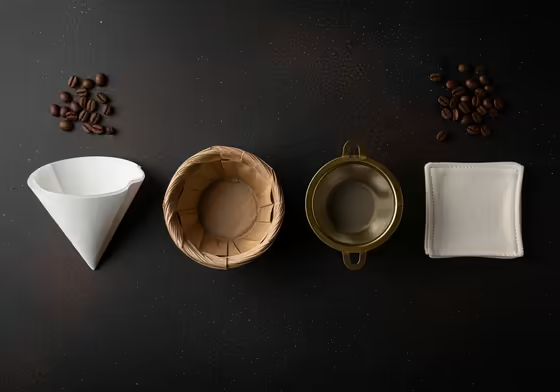
This guide will help you choose the right one for your needs.
Every filter is a trade-off between four things:
- Taste: Do you like a clean, bright cup of coffee? Or do you prefer a rich, full-bodied one?
- Health: Are you watching your cholesterol? The filter you use can affect it.
- Cost and Convenience: Do you want a quick cleanup you can throw away? Or would you rather pay more upfront for a reusable filter that needs daily washing?
- Environment: Is a zero-waste filter important to you? Or is a compostable paper filter good enough?
We’ll walk you through all these choices, from the type of material to the shape of the filter.
Paper vs. Metal vs. Cloth Filters
Your first and biggest decision is the filter material. The three main types are paper, metal, and cloth. Each one works very differently.
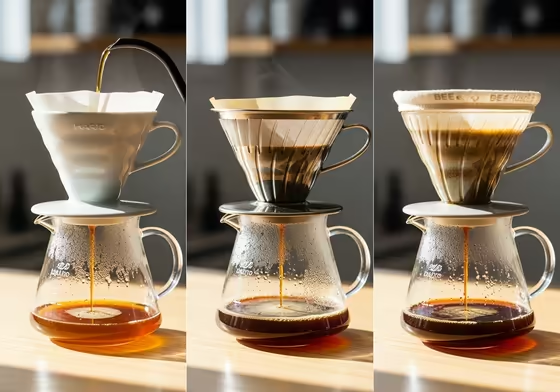
Are paper or reusable coffee filters better?
This is the biggest debate when it comes to coffee filters. The choice between paper and a reusable filter (like metal) changes everything about your coffee.
Here’s the main difference. Paper filters absorb oils, while metal filters just separate grounds from water.
- Paper filters are made of tiny fibers that trap coffee grounds. They also absorb the natural oils from the coffee beans.
- Metal filters are like a fine sieve. Their only job is to keep large coffee grounds out of your cup. All the fine particles and coffee oils pass right through.
Let's see how this affects your coffee.
Taste and Body
Your choice of filter will define how your coffee tastes and feels in your mouth.
- Paper filters absorb the oils and tiny coffee bits. This makes the coffee taste "cleaner" and feel lighter. It's great for bringing out the bright, fruity notes in a light roast coffee.
- Metal filters create the opposite kind of coffee. The oils and small grounds give the coffee a richer flavor and a fuller, heavier body. You might notice some sediment at the bottom of your cup.
Health
If you are concerned about cholesterol, this is a very important factor. The science here is pretty clear.
- Paper is the healthier option. Coffee oils contain compounds called cafestol and kahweol, which are known to raise bad (LDL) cholesterol. Paper filters absorb these oils and remove them from your coffee.
- Metal filters let all of the cafestol and kahweol into your cup. From a health standpoint, drinking coffee from a metal filter is the same as drinking unfiltered coffee.
Cost and Cleaning
Reusable filters save money over time, but they require daily cleaning.
- Paper filters are very convenient. You just toss the filter and grounds in the compost when you're done. The downside is that you have to keep buying them.
- Metal filters cost more at first but can save you money in the long run. The main drawback is that you have to wash them after every single use. If you don't clean them well, the mesh can get clogged with old oils and make your coffee taste bitter.
A Quick Note on Your Grinder
If you use a metal filter, your coffee grinder matters more. Metal filters need a coarse, even grind to work well. If you use a cheap blade grinder, it will create a lot of fine coffee dust that will pass through the mesh and make your coffee muddy.
The Third Option: Cloth Filters
Cloth filters try to offer the best of both worlds. They catch the sediment like paper, but let some oils through like metal. This gives you a clean cup with a full body.
The big problem with cloth filters is cleaning. They are very hard to maintain. You have to rinse them right away and store them in water in the fridge so the oils don't go bad and make your coffee taste gross.
Are gold coffee filters better?
Gold coffee filters are just a type of metal filter. They are usually a stainless steel mesh with a gold-colored coating.
- They work exactly like other high-quality metal filters. They let oils and fine grounds into your cup, which creates a full-bodied coffee.
- They do not filter out the cafestol that raises cholesterol. Coffee made with a gold filter is the same as unfiltered coffee.
- The "gold" part is mostly for looks. It doesn't make the filter work any better than a regular stainless steel one.
Do bamboo coffee filters make a difference?
Bamboo coffee filters are a type of paper filter. They are marketed as a more eco-friendly option.
- Some people say they are tasteless. But others report that bamboo filters can give coffee a stronger paper taste than regular filters.
- If you use bamboo filters, make sure to rinse them very well with hot water before brewing. This will help wash away any woody or papery taste.
Best organic coffee filters
"Organic coffee filters" are usually reusable cloth filters. They are often made from organic cotton or hemp.
- These filters give you a taste that's in between paper and metal. They trap the sediment but let some oils through for a clean yet full-bodied cup.
-
Maintenance is the biggest challenge. An organic cloth filter is a choice for a hobbyist, not for someone who wants convenience.
- You have to rinse it with hot water after every use.
- Every few weeks, you must boil the filter for about 10 minutes to remove the built-up oils. If you don't, the oils will go bad and ruin the taste of your coffee.
Is it better to use white or brown coffee filters?
This is a common question, and it's simpler than you might think. The choice is between taste and how the paper is processed.
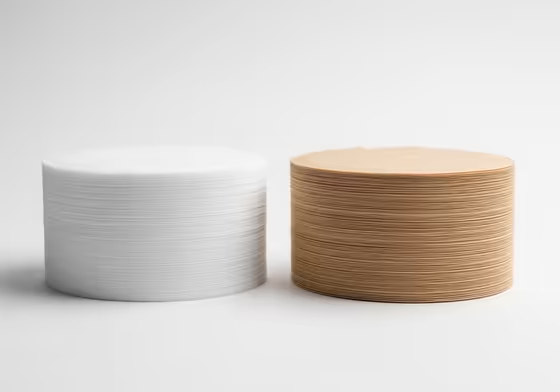
The Main Difference
- Brown (unbleached) filters are paper in its natural state. They are less processed.
- White (bleached) filters are brown paper that has been processed to remove the color and wood components.
The Taste Test
- Brown filters can give your coffee a "papery" or "cardboard" taste if you don't rinse them well.
- White filters are much more neutral in taste. The process that whitens them removes the stuff that causes the paper taste.
The Solution: Always Rinse Your Filter
You should always pour hot water through your paper filter before adding coffee grounds. This washes away any paper dust and also heats up your brewer. Brown filters just need a much more thorough rinse than white ones.
The "Bleach" Myth
Some people worry about "bleach" in white filters. This fear comes from old paper-making methods from decades ago that used chlorine bleach.
Today, good filter brands use safe methods like oxygen bleaching. This process uses hydrogen peroxide (oxygen) to whiten the paper and is perfectly safe. Modern white filters do not affect your health.
So, which is better?
- For Taste: White filters are better because they are taste-neutral.
- For the Environment: Brown filters are slightly better because they are less processed.
- For Health: Both are safe. The most important thing for your health is using any paper filter to remove the cholesterol-raising oils.
Filter Shapes: Cone vs. Flat-Bottom
After material, the next big thing is the shape of the filter. The shape changes how water flows through the coffee grounds.
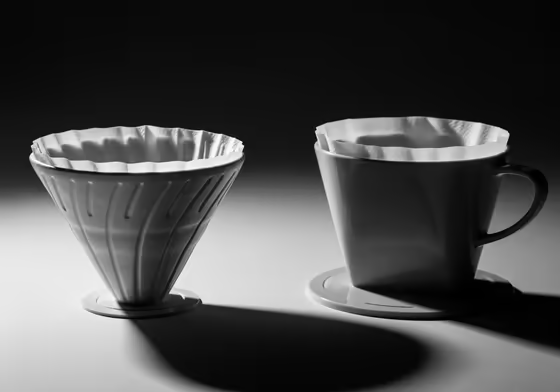
Are cone or basket coffee filters better?
One isn't better than the other, but they do create different flavors. A 2019 study proved that filter shape alone makes a big difference in how coffee tastes.
Here’s how they work.
- Cone filters have a V-shape that comes to a point. This makes the coffee grounds sit in a deeper pile. Water flows through a small exit point at the bottom.
- Flat-bottom filters are shaped like a basket or a cupcake liner. This creates a wider, shallower bed of coffee grounds. The water flows more slowly and evenly through the coffee.
This difference in shape leads to different flavors.
- Cone filters (like a Hario V60) tend to bring out brighter, more citrusy flavors in light roasts. But with dark roasts, they can sometimes create more bitterness.
- Flat-bottom filters (like a Kalita Wave or a standard Mr. Coffee basket) bring out sweeter, more floral, and chocolatey notes.
What about ease of use?
- Flat-bottom filters are generally more forgiving and easier to use. It's harder to mess up and you'll get a good, balanced cup of coffee more consistently.
- Cone filters require more skill to use. It's easier to get a bad cup if your pouring technique isn't right. However, some coffee experts feel they have a higher potential for a perfect cup.
You can even use this to your advantage. If you have a bright, fruity coffee, a cone filter will make those fruit notes pop. If you want to tone down the brightness and bring out more sweetness, a flat-bottom filter will do that.
Understanding Coffee Filter Sizes
Filter sizes can be confusing because different shapes use different numbering systems.
What's the difference between #2 and #4 coffee filters?
The simple answer is that a #4 filter is bigger than a #2 filter. The number just refers to the size of the cone-shaped brewer it's meant for.
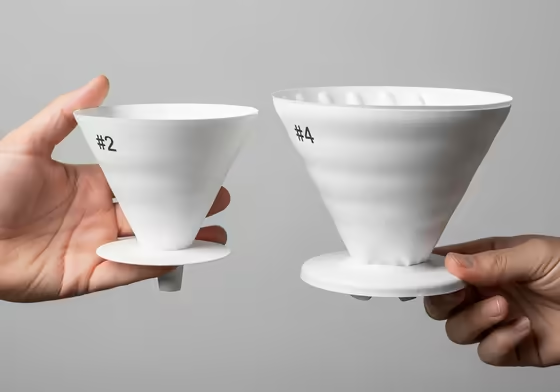
- #2 Filters are for smaller coffee makers, usually 2-6 cup machines or small pour-over brewers.
- #4 Filters are the larger, more common size. They fit most 8-12 cup coffee makers.
What is a #1 coffee filter?
This is the smallest standard cone size. It's designed for single-cup brewers.
A Guide to Filter Sizes
It's important to know that the #1, #2, and #4 numbers are almost always for cone-shaped filters. Basket filters (the flat ones) use a different system based on the coffee maker's cup capacity.
- A filter for a "12 Cup" machine is the most common basket filter size, called an "8-12 cup basket filter."
- "6 Coffee Filters" is a bit vague. It could mean a #2 cone filter or a "4-6 cup basket filter."
Special brewers like the Hario V60 and Kalita Wave have their own sizing systems, like V60 "02" or Kalita "185."
Coffee Filter Size & Compatibility Guide
| Filter Size / Name | Filter Shape | Typical Brewer Capacity | Common Brewer Examples |
|---|---|---|---|
| #1 | Cone | 1 cup | Moccamaster Cup-One, Single-cup cone drippers |
| #2 | Cone | 2-6 cups | Melitta 2-6 cup pour-over, smaller cone drip machines |
| #4 | Cone | 8-12 cups | Moccamaster (most 8-10 cup models), larger cone drip machines |
| #6 | Cone | 10+ cups | Large batch brewers, large 10-cup pour-over systems |
| 8-12 Cup Basket | Basket (Flat-Bottom) | 8-12 cups | Mr. Coffee (most models), most standard automatic drip machines |
| Hario V60 "01" | Cone (Specialty) | 1-2 cups | Hario V60 01 Dripper |
| Hario V60 "02" | Cone (Specialty) | 1-4 cups | Hario V60 02 Dripper |
| Kalita Wave 155 | Flat-Bottom "Wave" | 1-2 cups | Kalita Wave 155 Dripper |
| Kalita Wave 185 | Flat-Bottom "Wave" | 2-4 cups | Kalita Wave 185 Dripper |
| Chemex | Proprietary Cone | 3-13 cups | Chemex Brewer (size-specific filters) |
Best Filters for Your Coffee Maker
Best coffee filters for Moccamaster
For a high-end coffee maker like a Moccamaster, the right filter is very important. Moccamaster strongly recommends using their own #4 white paper filters for their standard machines.
They recommend paper for two main reasons. First, white paper is tasteless and lets the real flavor of the coffee come through. Second, paper absorbs the oils that can raise cholesterol.
Moccamaster warns against using reusable metal or gold filters. The oils from the coffee can clog the fine mesh. This can cause the brew basket to overflow or make your coffee taste bitter.
Best Coffee filters for Mr Coffee
For a classic Mr. Coffee machine, the choice is pretty simple. Most models use a standard 8-12 cup basket filter.
You can use either paper basket filters or a reusable gold-tone filter. Paper will give you a cleaner, healthier cup. The reusable filter will give you a richer, more full-bodied taste.
Best paper coffee filters for drip coffee
"Drip coffee" can mean an automatic machine or a manual pour-over. For automatic machines, the best filter is one that's the right shape and size for your brewer.
For manual pour-over, the filter is a key part of the brewing system.
- Chemex filters are unique because they are 20-30% thicker than other paper filters. This thick paper absorbs almost all oils and sediment. The result is an exceptionally clean cup of coffee.
- Hario V60 filters are thin, cone-shaped filters. Coffee fans often debate which version is better. Some prefer older Japanese versions because they allow water to flow faster.
Is Filtered Coffee Healthier?
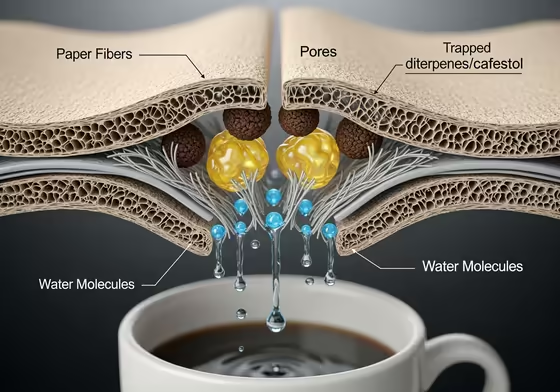
Is it better to drink filtered coffee?
If you are concerned about cholesterol, the answer is a clear YES. Drinking paper-filtered coffee is much healthier than drinking unfiltered coffee.
Coffee beans contain oily compounds, mainly cafestol and kahweol. Studies show that these compounds significantly raise levels of bad (LDL) cholesterol.
Paper filters are great at trapping these oily compounds. A paper filter can remove up to 95% of the cafestol. Thicker paper filters, like those for a Chemex, are even more effective.
Brewing methods that don't use a paper filter contain high levels of these compounds. These include French press, boiled coffee, and coffee made with metal or gold filters. For this reason, groups like the American Heart Association recommend paper-filtered coffee.
Here's the trade-off. The same oils that give coffee a rich flavor and full body are the ones that contain the cholesterol-raising stuff. You have to choose between getting maximum body and prioritizing your heart health.
A Closer Look at Special Brands
For serious coffee lovers, some brands have turned filters into high-performance gear.
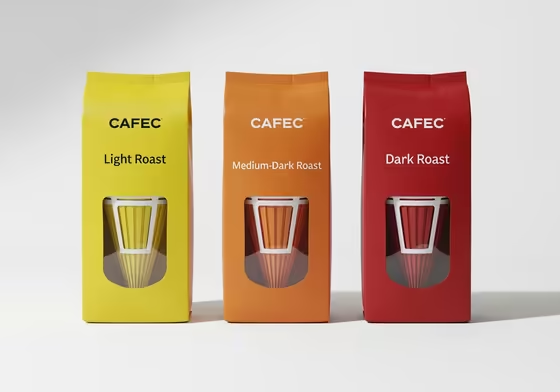
Kalita coffee filters
Kalita Wave filters have a unique design with 20 pleats or "waves." These waves are designed to limit contact between the paper and the wall of the brewer.
This promotes a very even extraction of the coffee. It's why Kalita has a reputation for being so consistent and forgiving.
The main problem is that you have to use Kalita's special filters. They can be hard to find in stores and you often have to order them online.
Cafec Filters
Cafec is a Japanese brand that is very popular with coffee experts. They have made the paper itself a tool for controlling how you brew coffee.
Their Abaca filters are made from Manila hemp and are known for a very fast flow rate. This helps prevent the filter from clogging.
Cafec's biggest invention is their roast-specific filters. They make different papers with different thicknesses and textures to control how fast water flows through.
- Light Roast Filter: This paper has a very slow flow rate. It forces water to be in contact with the coffee for longer, which helps fully extract flavor from less soluble light roast beans.
- Medium-Dark Roast Filter: This paper has a very fast flow rate. It prevents over-extraction and gives the brewer more control over the taste.
- Dark Roast Filter: This paper has a medium flow rate. It's designed to build body and sweetness without pulling out the bitter flavors common in dark roasts.
This system lets you use the filter itself to fix your brew. For example, if your light roast tastes sour, you can switch to the slow filter to get a better extraction.
Additional Resources
What Coffee Fans on Reddit Say
On coffee-focused Reddit communities, you can see what serious home brewers think.
- Cafec is overwhelmingly the favorite brand in these communities. The Abaca and the fast T-90 filters are mentioned most often.
- People also love Chemex for its super-clean coffee. Kalita is respected for its consistency, but users agree the filters are a pain to find.
Which Filter Should You Get? A Quick Guide
There is no single best coffee filter. There is only the best filter for what you want.
-
If you want... TASTE (Full Body & Richness)
- Winner: Metal/Mesh Filter
- Why: It’s the only filter that lets all the flavorful oils and fine particles into your cup, creating a rich, full-bodied coffee.
-
If you want... TASTE (Clarity & Cleanliness)
- Winner: Thick Paper Filter (like Chemex)
- Why: The extra-thick paper removes almost all oils and sediment. This creates a very clean cup that lets you taste the coffee's delicate notes.
-
If you want... HEALTH (Managing Cholesterol)
- Winner: Paper Filter (any kind)
- Why: Science shows that paper is the only material that reliably removes the cafestol that raises cholesterol.
-
If you want... CONVENIENCE (Easiest Cleanup)
- Winner: White Paper Filter
- Why: They don't affect taste, cleanup takes seconds, and they require zero maintenance.
-
If you want... ENVIRONMENT (Zero Waste)
- Winner: Reusable Cloth Filter
- Why: They are reusable and often made from organic, biodegradable materials. But this choice requires a strict cleaning routine.
-
If you want... The Enthusiast's Choice (Full Control)
- Winner: Specialty Paper Filters (like Cafec)
- Why: These filters let you control the flow rate and extraction just by changing the paper. It offers a level of control no other filter can match.